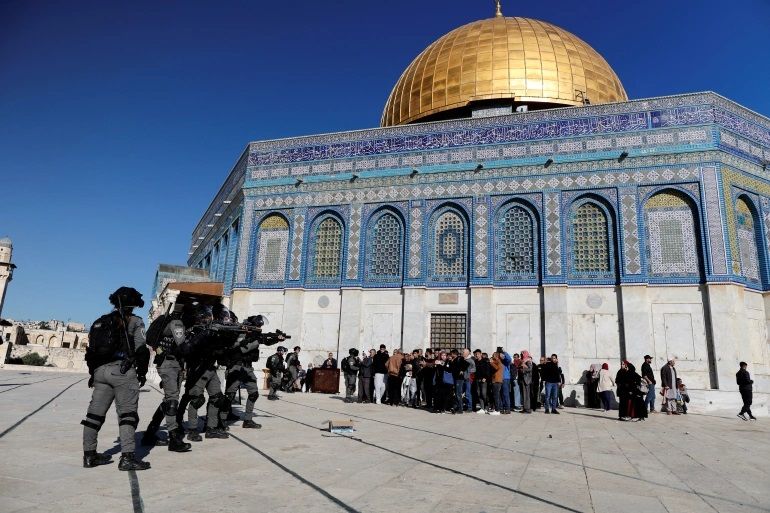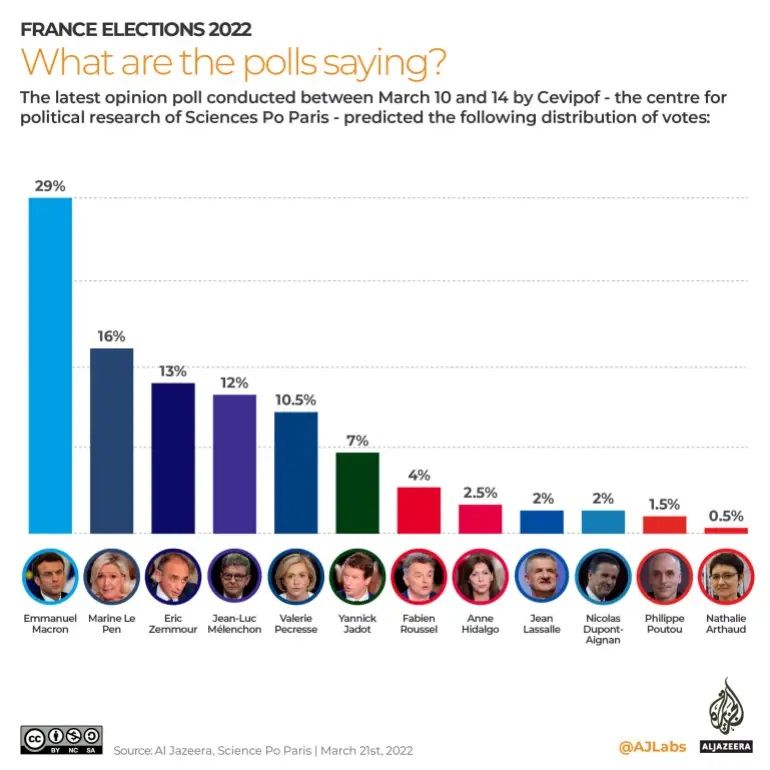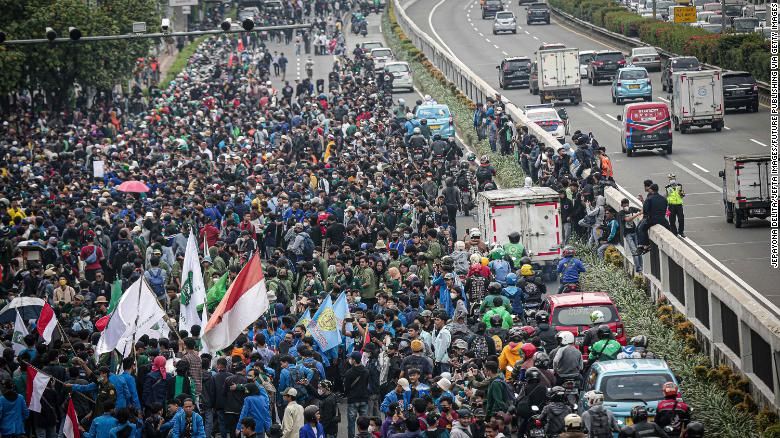
既无故土,也不分南北。
[247 every moment] The Israeli occupiers exploded many atrocities again; Macron and Le Pen entered the second round of the French presidential election
Israel's occupiers repeat atrocities
On April 15, Israeli forces raided the Al-Aqsa Mosque (المسجد الاقصى) in Israeli-occupied East Jerusalem. Israel claims the raid was to disperse "thugs" praying at the mosque. The Palestinian Red Crescent Society (جمعية الهلال الأحمر الفلسطيني) reported that a total of 158 people were injured in the raid and the ensuing clashes. The Red Crescent also accused the Israeli army of preventing ambulances from reaching the scene. Witnesses said the Israeli military's attacks were indiscriminate and even attacked the ambulancemen present. Israeli police said they had arrested hundreds of people during the operation and three officers were injured in a "massive stone-throwing act".

The Palestinian Authority (السلطة الوطنية الفلسطينية) then issued a joint statement condemning the Israeli attack. In a statement, the Palestinian President (رئيس دولة فلسطين) called Israel's actions a "declaration of war" and called on the international community to end "Israeli aggression". A spokesman for the Israeli prime minister said that Israel respects freedom of religion and belief. The Israeli military police acted in response to the unprovoked stone-throwing of the "Palestinian mob". Al Jazeera said that a far-right Jewish group had previously called on Jews to raid the mosque.
Since March 22, Israel has stepped up its attacks on Palestine. The attack has intensified the conflict between Palestine and Israel, and 16 Palestinians have been killed so far. Fourteen Israelis were killed in attacks by Palestinians in four Israeli cities. The attacks were reportedly linked to the Palestinian Authority and the Islamic State, respectively. It was the deadliest violence between Palestine and Israel since 2016.
The Israeli army says its actions are aimed at fighting "terrorism" and guaranteeing Israel's security. However, on April 11, an Israeli army attack resulted in the killing of a 17-year-old Palestinian teenager. He was a relative of the killer of the April 8 Tel Aviv bar attack who was killed on his way home. The Israeli human rights group Btzelem (בצלם) called the act "collective punishment". Another woman was shot dead at a military checkpoint near Bethlehem on March 10. The European Union's diplomatic mission in the Palestinian territories has accused Israel of using unacceptably excessive force to shoot the unarmed woman.
Since 1947, Israel has violated the "Partition Plan" proposed by the United Nations General Assembly Resolution 181, and has continued to expand abroad to occupy Palestinian territories . Resolutions of the UN Security Council and the General Assembly over the years have repeatedly emphasized that "Israel's establishment of settlements in the Palestinian territories occupied since 1967, including East Jerusalem, has no legal effect." This 55-year occupation is the longest in modern world history. occupied.
On February 19, Amnesty International released a report titled "Israel's Apartheid against Palestinians: A brutal regime of rule and crimes against humanity", which pointed out that Israel has confiscated Palestinians' land and property on a large scale, and illegally killed them. , forced displacement, severe restrictions on movement, and deprivation of nationality and citizenship of Palestinians constitute crimes against humanity. Amnesty National stressed that these crimes must be held accountable and called on the International Criminal Court to investigate.
Macron, Le Pen enter second round of French presidential election
On April 10, the first round of the French presidential election was held. Incumbent President Emmanuel Jean-Michel Frédéric Macron won 28 percent of the vote, while Marine Le Pen of the far-right Rassemblement national won 23 percent. They will face off in the second round of the election, as they did in the 2017 presidential election.
As for other candidates, the far-left La France insoumise candidate Jean-Luc Mélenchon came third with 22% of the vote. Far-right Éric Zemmour won 7.1 percent of the vote, while center-right Les Républicains candidate Valérie Pécresse got just 4.8 percent. With the exception of Zemur, the other candidates called on their supporters to vote for Macron and not for Le Pen after the polls closed. Mei Langxiong shouted "No vote for Le Pen" at the press conference.

Analysts pointed out that Le Pen will give up the far-right identity politics in this election and focus on people's livelihood issues, and his voters may include traditional left and right voters. The emergence of Zemur makes Le Pen's far-right leanings even weaker. Melenchon's supporters are crucial in the second round of voting. Macron and Le Pen have launched their own canvassing operations. Le Pen's actions continue to focus on rising commodity prices. Macron claimed that he could revise the pension reform plan and strengthen the transition to a green economy in order to win over Mélenchon's supporters.
French presidential elections are held every five years. The election adopts a two-round voting system. The candidate who obtains more than half of the votes in the first round of voting can be elected as the president. If no candidate obtains more than half of the votes in the first round of voting, the two candidates with the most votes in the first round of voting shall be elected. Candidates can enter the second round of voting, and the candidate with the most votes in the second round of voting is elected president. The second round of elections will be held on April 24.
Ukrainian war continues, Russian warship sunk
On April 14, the Russian Ministry of Defense confirmed that the flagship of its Black Sea Fleet, the guided-missile cruiser Moskva, was severely damaged and sank at the bottom of the Black Sea. Ukraine has previously claimed that the Ukrainian side attacked the warship with a "Neptune" missile. The Russian side said that the crew on the ship had been evacuated, but did not talk about casualties.
On April 12, a Ukrainian MP said that the Russian army used chemical weapons in the attack on Mariupol. The U.S. Department of Defense stated that the news could not be confirmed for the time being. On April 13, the Russian army said that all the soldiers in the area had surrendered, but the Ukrainian side has denied this news. Ukrainian President Volodymyr Zelensky warned Russia that talks would be terminated immediately if all its soldiers were killed.
Russia's invasion of Ukraine has caused Finnish and Swedish societies to re-examine their principles of neutrality and support plans to join NATO. Finland's prime minister said it would be decided by the country's parliament within weeks. Russia has warned that joining NATO will undermine regional peace. If the two countries join NATO, Russia will likely deploy nuclear weapons in Kaliningrad (Калининград), a Russian-controlled enclave in the Baltic Sea region.
The World Trade Organization predicts that Russia's invasion of Ukraine could nearly halve global trade growth in 2022. The WTO also said the war disrupted global supply chains and could reduce global GDP growth by 0.7 to 1.3 percentage points.
World Inflation Continues, Sri Lanka Still Deep in Economic Crisis
U.S. inflation climbed to 8.5% in March, the highest level since late 1981. Inflation in the UK jumped to 7% in March from 6.2% in February, the highest level in 30 years. Retail prices in India also rose to 6.95% year-on-year, surpassing the RBI's target range for the third month in a row, as global food prices rose.
Sri Lanka's central bank governor said the country will default on its entire foreign debt worth $51 billion. The country's foreign exchange reserves have plummeted 70 percent in less than two years, to just $2.3 billion. On April 18, the finance minister will begin emergency consultations with the International Monetary Fund.
Mass shootings in New York, Columbia
On April 12, a mass shooting occurred in the New York subway. A 63-year-old black man attacked when a Manhattan-bound train stopped at the 36th Street subway station in Brooklyn. He detonated smoke grenades and opened fire, injuring a total of 28 people.
On April 13, the suspect turned himself in, and the New York police formally charged him with terrorism charges. If convicted, he will face life in prison. New York police said he has temporarily ruled out the possibility that he has ties to terrorist organizations. The suspect had uploaded a video criticizing racial discrimination, violent crime and problems with psychiatric services in the United States.
On April 16, there was also a shooting at a shopping mall in Columbia, South Carolina. The incident resulted in 10 people being shot. The Columbia Police Department has made three arrests. Police said the shooting was not an indiscriminate attack.
Student protests erupt in Indonesia; Indonesian parliament passes sexual violence bill
On April 11, Indonesian police used tear gas and water cannons to disperse hundreds of students protesting in the Indonesian capital, Jakarta. The protest was part of a nationwide protest in Indonesia on the 11th.
The protests have focused on rising prices and President Joko Widodo's plans to amend the constitution to delay elections for a third term. The president was ambiguous on the issue, refusing to take a stand.

On April 12, Indonesia's parliament passed a historic law to address the country's rampant sexual violence. Prosecuting sex crimes in Indonesia used to be complicated by the lack of specific legislation. Activists say victims' fear of being humiliated during interrogations has discouraged many from reporting the sexual violence they experienced.
Under the new law, physical abuse of a spouse or non-spouse is punishable by up to 12 years in prison. Forced marriage, including involving minors, is punishable by up to nine years in prison. Non-consensual distribution of sexual content is punishable by up to 4 years in prison. At the same time, the bill also provides that the court can award compensation to the victim, as well as provide community-based organization consultation services.
In 2021, an Islamic boarding school teacher sexually assaulted 13 students in Indonesia, sparking outrage, and Indonesian President Joko Widodo in January called on Congress to speed up the passage of a sexual violence bill that has been blocked for years.
UK PM fined for 'party gate', opposition urged to step down
In the UK, Boris Johnson and Chancellor of the Exchequer Rishi Sunak have been fined by London's Metropolitan Police (Scotland Yard) for breaching restrictions on gatherings during the UK's lockdown. Boris Johnson's wife was also fined. Downing Street confirmed the fine was due to a birthday celebration on June 19, 2020.
The British Prime Minister and the staff of No. 10 Downing Street have been accused of holding multiple parties in 2020 when the United Kingdom is in a state of restricted gatherings due to the epidemic. At the time, the UK government had passed laws prohibiting gatherings of more than two people in public places or any indoor gatherings other than work. The Metropolitan Police Department has issued 50 fixed tickets for the parties. Sue Gray, Second Permanent Secretary to Cabinet Office, said in the investigative report that the parties were "difficult to explain" and were a sign of "errors of leadership and judgment". The British Prime Minister has repeatedly apologized for breaking the ban.
Opposition Labour leader Sir Keir Rodney Starmer should resign immediately after accusing the prime minister and chancellor of breaking the law and repeated public lies. The leader of the opposition Liberal Democrats, Sir Ed Davey, has called for a no-confidence motion to be discussed in Parliament to end the recess.
Boris is already under intense pressure within the Conservative Party. Former Prime Minister Theresa May asked Boris "did he not read government laws, didn't understand what those laws meant, or thought they didn't apply to 10 Downing Street?" in previous debates, but the Conservative Party It is considered inappropriate to change the prime minister during the Ukrainian war.
other news
The South Korean government announced on April 15 that it will end all epidemic prevention restrictions from April 18. But the mandatory mask order is still in effect. At the same time, starting from the 25th, the new crown will be downgraded from a Class A infectious disease to a Class B infectious disease, that is, it will no longer be mandatory for infected people to isolate or receive treatment in designated hospitals.
Pakistan's parliament elected Shebaz Sharif (شہباز شریف) as the country's prime minister.
Taliban officials blamed Pakistan for an early morning rocket attack on its border with Afghanistan that killed five children and a woman.
South Africa's KwaZulu-Natal province was hit by a massive storm, with the resulting flooding destroying nearly 4,000 homes and killing nearly 400 people. President Matamela Cyril Ramaphosa linked the event to extreme weather caused by climate change.
(Editor in charge: New Bremen)
Like my work?
Don't forget to support or like, so I know you are with me..
Comment…